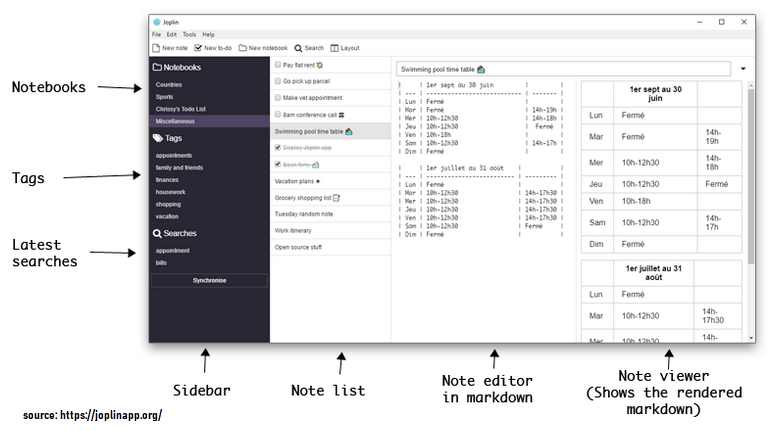How to Install Joplin on Ubuntu 24.04 — Complete Open Source Note-Taking Setup

In the world of productivity and note-taking, Joplin stands out as one of the most powerful open-source alternatives to Evernote and Notion. It’s designed for privacy-conscious users who want full control over their data, without relying on cloud vendors.
In this article, we’ll explore what Joplin is, why it’s a great choice for Linux users, and how you can install Joplin on Ubuntu 24.04 step-by-step. By the end, you’ll have a fully functional note-taking environment ready for use.
What is Joplin?
Joplin is a free and open-source note-taking and to-do application that supports:
- Markdown formatting for clean and structured notes
- Notebook organization for better categorization
- Synchronization with multiple cloud services (Dropbox, OneDrive, Nextcloud, WebDAV)
- End-to-end encryption for privacy and data security
Originally developed by Laurent Cozic, Joplin has become a go-to solution for students, developers, and professionals looking for a self-hosted and secure note management system.
Why Choose Joplin on Ubuntu 24.04?
Ubuntu 24.04 is the latest LTS (Long-Term Support) release, offering improved performance, stability, and better support for modern applications. Combining Joplin with Ubuntu gives you:
- A secure and customizable setup
- Better integration with system themes and icons
- Fast installation using Snap, Flatpak, or AppImage
- Sync flexibility — you can store notes locally or in your own cloud
If you prefer open-source applications and value data privacy, Joplin is an excellent choice for Ubuntu users.
System Requirements
Before starting, ensure that your system meets the following basic requirements:
| Component | Minimum Requirement |
|---|---|
| Operating System | Ubuntu 24.04 LTS |
| Processor | 64-bit CPU |
| RAM | 2 GB minimum |
| Disk Space | 200 MB for installation |
| Internet Connection | Required for downloading Joplin packages |
Installation Methods
There are three recommended methods to install Joplin on Ubuntu 24.04:
- Using Snap (easiest method)
- Using AppImage (portable method)
- Using Flatpak (flexible for sandboxed environments)
We’ll cover all three below.
1. Install Joplin Using Snap
The Snap package is the most convenient and official way to install Joplin on Ubuntu.
Step 1: Update Your System
sudo apt update && sudo apt upgrade -yStep 2: Install Snap (if not already installed)
sudo apt install snapd -yStep 3: Install Joplin via Snap
sudo snap install joplin-desktopStep 4: Launch Joplin
Once the installation is complete, open Joplin from the Application Menu or run:
joplin-desktopThis method ensures automatic updates managed by the Snap Store.
2. Install Joplin Using AppImage
The AppImage package allows you to run Joplin without installing dependencies system-wide. It’s completely portable.
Step 1: Download the Latest AppImage
Visit the official Joplin GitHub releases page:
👉 https://github.com/laurent22/joplin/releases
Find the latest version (for example: Joplin-2.14.20.AppImage) and download it using wget:
wget https://github.com/laurent22/joplin/releases/download/v2.14.20/Joplin-2.14.20.AppImageStep 2: Make It Executable
chmod +x Joplin-2.14.20.AppImageStep 3: Run Joplin
./Joplin-2.14.20.AppImageYou can optionally move the AppImage to /opt or create a desktop shortcut for easier access.
3. Install Joplin Using Flatpak
Flatpak offers a sandboxed environment — ideal if you prefer isolating apps from the system.
Step 1: Install Flatpak
sudo apt install flatpak -yStep 2: Add Flathub Repository
flatpak remote-add --if-not-exists flathub https://flathub.org/repo/flathub.flatpakrepoStep 3: Install Joplin
flatpak install flathub net.cozic.joplin_desktop -yStep 4: Launch Joplin
flatpak run net.cozic.joplin_desktopPost-Installation Setup
Once Joplin is installed, here’s how to make the most of it:
1. Enable Synchronization
- Go to Tools → Options → Synchronization
- Choose a cloud provider like Dropbox, Nextcloud, or WebDAV
- Set synchronization interval (e.g., every 10 minutes)
2. Enable End-to-End Encryption
To secure your notes:
- Go to Tools → Encryption Options
- Enable E2EE and set a strong password
3. Customize Appearance
Joplin supports light/dark themes and rich text or Markdown views:
- Tools → Appearance → select your theme preference
- Adjust font size and editor width for comfort
4. Install Plugins
Joplin’s community offers various plugins:
- Go to Tools → Options → Plugins
- Click Get More Plugins
- Install add-ons like Calendar, Outline, or Mermaid diagram support

How to Uninstall Joplin
If you want to remove Joplin later, use the command corresponding to your installation method:
Snap:
sudo snap remove joplin-desktopFlatpak:
flatpak uninstall net.cozic.joplin_desktopAppImage:
Simply delete the AppImage file:
rm Joplin-2.14.20.AppImageTroubleshooting Common Issues
| Issue | Solution |
|---|---|
| Joplin doesn’t launch | Try running from terminal to see error logs. |
| Synchronization fails | Check internet and cloud credentials. |
| Missing icons or theme glitches | Reinstall or clear Joplin config under ~/.config/joplin-desktop. |
| AppImage won’t run | Ensure you set execution permission (chmod +x). |
Frequently Asked Questions (FAQ)
1. Is Joplin free to use?
Yes, Joplin is 100% free and open-source under the MIT license.
2. Can I use Joplin on my phone?
Yes, Joplin has mobile apps for Android and iOS that sync with your desktop version.
3. Does Joplin support cloud backup?
Absolutely. You can connect it with Nextcloud, Dropbox, OneDrive, or self-hosted WebDAV.
4. Is my data secure?
Yes, Joplin supports end-to-end encryption, meaning only you can access your data.
Conclusion
Installing Joplin on Ubuntu 24.04 is straightforward and flexible — whether you prefer Snap, Flatpak, or AppImage.
As an open-source note-taking tool, it offers powerful Markdown support, offline capabilities, synchronization options, and encryption, making it ideal for privacy-minded users and developers alike.
If you’re looking for a clean, reliable, and privacy-first note-taking experience, Joplin is one of the best open-source apps you can install today.